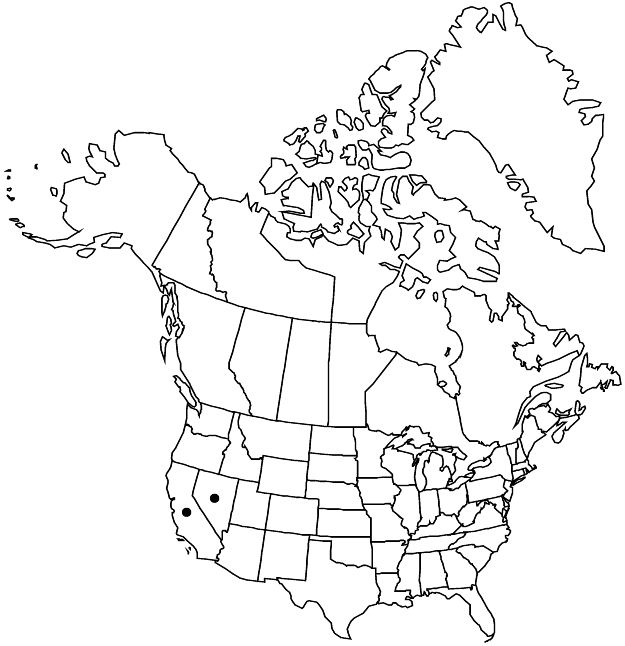Difference between revisions of "Ivesia aperta"
Suppl. Calif. Fl., 111. 1968.
FNA>Volume Importer |
FNA>Volume Importer |
||
| Line 17: | Line 17: | ||
|name=Potentilla aperta | |name=Potentilla aperta | ||
|authority=J. T. Howell | |authority=J. T. Howell | ||
| + | |rank=species | ||
|publication_title=Leafl. W. Bot. | |publication_title=Leafl. W. Bot. | ||
|publication_place=9: 239. 1962 | |publication_place=9: 239. 1962 | ||
| Line 33: | Line 34: | ||
|distribution=w United States. | |distribution=w United States. | ||
|discussion=<p>Varieties 2 (2 in the flora).</p><!-- | |discussion=<p>Varieties 2 (2 in the flora).</p><!-- | ||
| − | --><p>Many historic collections of <i>Ivesia aperta</i> were identified as <i>I. pickeringii</i>. D. D. Keck (1938) considered <i>I. aperta</i> to be no more than a yellow-flowered form of <i>I. sericoleuca</i>, a situation clarified and rectified by J. T. Howell (1962). The ranges of the two species overlap in Sierra Valley, California, with mixed populations occurring near Beckwourth and in the valleys north of Sierra Valley. In general, < | + | --><p>Many historic collections of <i>Ivesia aperta</i> were identified as <i>I. pickeringii</i>. D. D. Keck (1938) considered <i>I. aperta</i> to be no more than a yellow-flowered form of <i>I. sericoleuca</i>, a situation clarified and rectified by J. T. Howell (1962). The ranges of the two species overlap in Sierra Valley, California, with mixed populations occurring near Beckwourth and in the valleys north of Sierra Valley. In general, <i></i>var.<i> aperta</i> occurs in the southeastern portions of the valley and <i>I. sericoleuca</i> occurs on the western side; the species are not otherwise sympatric. In addition to petal color, which fades in herbarium material, <i>I. aperta</i> differs from <i>I. sericoleuca</i> in having smaller flowers with shallower hypanthia. Hairs at the base of the stems and petioles of <i>I. aperta</i> are relatively short (to 2 mm) and generally ascending; those of <i>I. sericoleuca</i> are longer (to 4 mm) and spreading. Variety canina combines the petal color of <i></i>var.<i> aperta</i> and floral dimensions of <i>I. sericoleuca</i>.</p> |
|tables= | |tables= | ||
|references= | |references= | ||
| Line 56: | Line 57: | ||
-->{{#Taxon: | -->{{#Taxon: | ||
name=Ivesia aperta | name=Ivesia aperta | ||
| − | |||
|authority=(J. T. Howell) Munz | |authority=(J. T. Howell) Munz | ||
|rank=species | |rank=species | ||
| Line 68: | Line 68: | ||
|publication year=1968 | |publication year=1968 | ||
|special status=Conservation concern;Endemic | |special status=Conservation concern;Endemic | ||
| − | |source xml=https://jpend@bitbucket.org/aafc-mbb/fna-data-curation.git/src/ | + | |source xml=https://jpend@bitbucket.org/aafc-mbb/fna-data-curation.git/src/f50eec43f223ca0e34566be0b046453a0960e173/coarse_grained_fna_xml/V9/V9_372.xml |
|subfamily=Rosaceae subfam. Rosoideae | |subfamily=Rosaceae subfam. Rosoideae | ||
|tribe=Rosaceae tribe Potentilleae | |tribe=Rosaceae tribe Potentilleae | ||
Revision as of 22:40, 16 December 2019
Plants greenish gray to silvery; glands sparse. Stems decumbent to erect, 1.5–4.5 dm. Basal leaves (7–)10–20(–23) cm; sheathing base densely strigose abaxially; stipules absent; petiole 4–8 cm, hairs abundant, ascending, ± 1(–3) mm; leaflets 20–35 per side, loosely overlapping, 3–15(–20) mm, lobes 0–4(–5), oblanceolate to elliptic, hairs abundant, ascending to appressed, ± 1(–2) mm. Cauline leaves 3–8. Inflorescences (10–)20–250-flowered, 1–14 cm diam., flowers arranged in several to many tight glomerules of 5–20 flowers. Pedicels 1–3(–15) mm. Flowers 5–12 mm diam.; epicalyx bractlets lanceolate, 1.5–2.5(–3.5) mm; hypanthium cupulate, 1–2 × 2.5–4(–5) mm, 1/2–2/3 as deep as wide; sepals green, 2.5–4(–5.5) mm, acute to acuminate; petals light yellow, oblanceolate to broadly obovate, 2–7 mm; stamens 20, filaments filiform, 1–4 mm, anthers yellow, 0.4–0.6 mm; carpels 2–7, styles 2–4 mm. Achenes brown, 2–3 mm.
Distribution

w United States.
Discussion
Varieties 2 (2 in the flora).
Many historic collections of Ivesia aperta were identified as I. pickeringii. D. D. Keck (1938) considered I. aperta to be no more than a yellow-flowered form of I. sericoleuca, a situation clarified and rectified by J. T. Howell (1962). The ranges of the two species overlap in Sierra Valley, California, with mixed populations occurring near Beckwourth and in the valleys north of Sierra Valley. In general, var. aperta occurs in the southeastern portions of the valley and I. sericoleuca occurs on the western side; the species are not otherwise sympatric. In addition to petal color, which fades in herbarium material, I. aperta differs from I. sericoleuca in having smaller flowers with shallower hypanthia. Hairs at the base of the stems and petioles of I. aperta are relatively short (to 2 mm) and generally ascending; those of I. sericoleuca are longer (to 4 mm) and spreading. Variety canina combines the petal color of var. aperta and floral dimensions of I. sericoleuca.
Selected References
None.
Lower Taxa
Key
| 1 | Petals 2–3 mm, oblanceolate; filaments 1–1.5(–2) mm; Sierra Valley drainage, California, Carson and Virginia ranges, Nevada. | Ivesia aperta var. aperta |
| 1 | Petals usually 4–7 mm, narrowly to broadly obovate; filaments 2–4 mm; Dog Valley, California, Nevada. | Ivesia aperta var. canina |